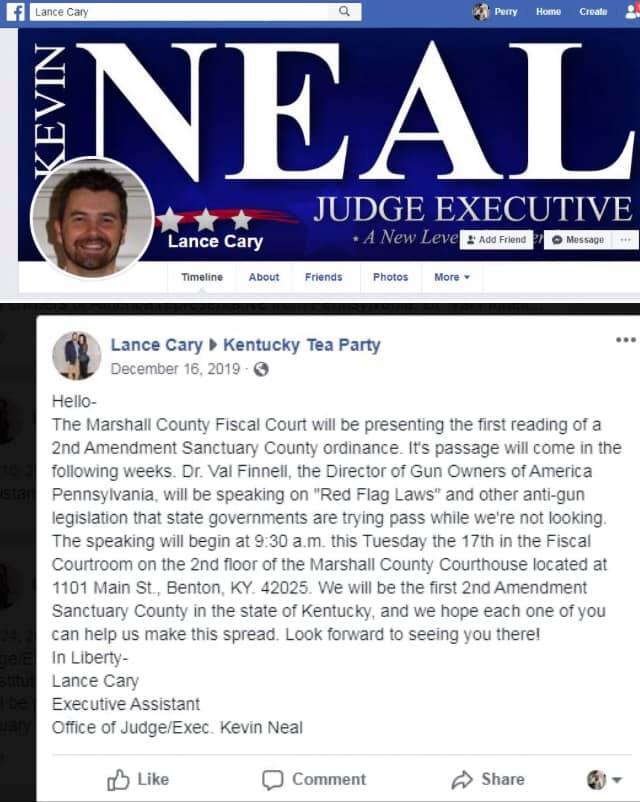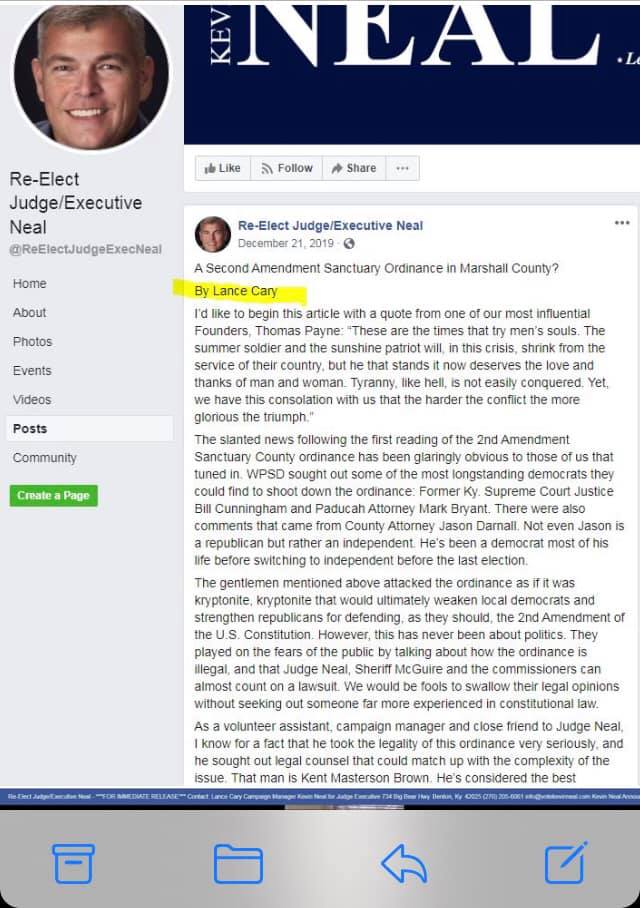

On July 9, Attorney General Daniel Cameron issued an open records decision — 20-ORD-095 (erroneously dated June 9) — which confirms that he intends to narrow the public's rights under the open records law.
He will not do so — yet anyway — by advocating for new exception to the law. Instead, he will chip away at 44 plus years of carefully vetted —and in most cases judicially tested — interpretation of those laws by his predecessors and the courts.
https://apps.legislature.ky.gov/law/statutes/statute.aspx?id=48230
That interpretation was aimed at ensuring that the existing exceptions to the law —which authorize agencies to withhold public records — were strictly construed and given no broader application than was necessary to implement their underlying purpose.
20-ORD-095 involves a request submitted by Perry Boxx, WPSD Local 6 News Director, to Marshall County Judge/Executive Kevin Neal for public records, including "email[s] and text messages between Marshall County officials and Lance Cary."
https://ag.ky.gov/Priorities/Government-Transparency/orom/2020/20-ORD-0…
Cary, as the attached screenshots indicate, has been active in the local Second Amendment Sanctuary County movement and has identified himself as Neal's "volunteer assistant, campaign manager, and close friend" as well as his "executive assistant."
Neal disputes Cary's status as his "executive assistant" in responding to the request and appeal but does not dispute Cary's involvement in advancing the Second Amendment Sanctuary County movement. He equivocates on the existence of records responsive to Boxx's request, but invokes KRS 61.878(1)(i) in denying the request, asserting that any such records constitute protected "correspondence with private individuals other than correspondence intended to give notice of final agency action."
Rejecting, without reversing, a line of open records decisions dating back to at least 2000, Cameron affirmed Neal's denial based on KRS 61.878(1)(i), concluding that all responsive records were correspondence with a private individual.
In a thinly veiled criticism of past administrations, Cameron wrote:
"This Office has previously imposed additional requirements on a public agency's reliance on this exemption. For example, in 18-ORD-117 this Office examined whether the private individual 'petition[ed] or advocate[d] for particular action by a public agency on a specific matter in which the agency was empowered to make a decision.' Id. at p. 2. The decision also examined whether the private individual expressed an intent that the correspondence remain confidential, either due to the subject matter of the letter or by express statements requesting confidentiality. Id. at p. 3.
"Those requirements are not supported by the plain text of KRS 61.878(1)(i). The Act does not only exempt correspondence with a private individual who requests confidentiality or only that correspondence in which the private individual does not 'petition' the agency; rather, it exempts 'correspondence with private individuals, other than correspondence which is intended to give notice of final action of a public agency.'KRS 61.878(1)(i).
"Although it is true that the Act's exemptions must be narrowly construed to achieve the public policy of free examination of public records, KRS 61.871, that does not mean this Office can add words to the statutory text. [Citation omitted.] And it can't eliminate them either. [Citation omitted]. Here, the addition of requirements not found in the text would operate to eliminate an exemption the General Assembly crafted. We decline to do so.
"The record before this Office demonstrates that Mr. Cary is a private citizen. Any communications between him and county officials are exempt unless those communications were intended to give notice of final agency. KRS 61.878(1)(i)."
That's right, General Cameron, past attorneys general recognized that reasonable restrictions on the exception were necessary to avoid absurd outcomes.
A letter from a private individual addressed to an official offering him or her a bribe (or from the official soliciting a bribe) in exchange for a particular action or outcome; a death threat to a public official from a private individual; extortion; lobbyists' letters; even a letter from a private contractor to a public agency relating to implementation of the contract — all would arguably be inaccessible to the public under your self-serving and short-sighted interpretation of the law.
(By the way, didn't you do a bit of administrative legislating yourself when you declared that KRS 61.878(1)(i) is really just a predicate to KRS 61.878(1)(j)?)
And what of your decision to reject but not reverse at least twenty years of open records decision approving and applying this strict construction of the exception for "correspondence with private individuals."
These competing and conflicting interpretations of the law leave the public, public agencies, attorneys representing them, and even the courts (who have declared that the attorney general's open records decisions are persuasive legal authority) in legal limbo.
Two lines of legal authority now emanate from the Office of the Attorney General. The parties can, we suppose, take their pick. But at this point, the overwhelming weight of authority supports the established interpretation that pre-dates Cameron's decision. 20-ORD-095 is the single aberration.
Five days ago we confidently wrote that a "voicemail from Dr. Steve Hotze — a Houston resident described as a GOP powerbroker — to Governor Greg Abbott, and obtained through the state's open records law, [that] urges the governor to send the National Guard to Houston with orders to shoot to kill protesters if they 'start rioting like they have in Dallas,'" would also be accessible under *Kentucky's* open records law.
https://ag.ky.gov/Priorities/Government-Transparency/orom/2019/19-ORD-2…
"Although Hotze appears to be a private individual," we wrote, "he created a public (and open) record when he left the voicemail for Governor Abbott.
"The same," we firmly believed based on at least twenty years of precedent, "would be true in Kentucky."
After 20-ORD-095, that belief has faded. We no longer labor under the delusion that Kentucky's open records law (and open meetings law) are safe in the hands of Attorney General Daniel Cameron.
That sound you hear is the chipping away of your rights under Kentucky's open government laws.


